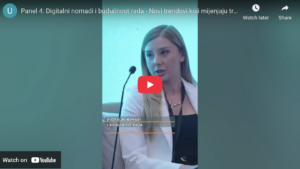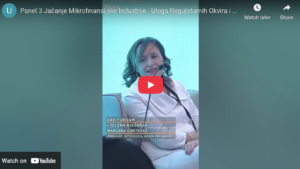
MICROBALKANS25: Reel Panel 5
Panel 5: Regulatory Innovation — How Policies Shape Technological Advancement At the MicroBalkans25 conference, Panel 5 brought together institutional representatives, technology leaders, and experts to

From 1996 to today, microcredit organizations (MCOs) through its work gave and continue to give significant contribution to overall social and economic recovery of BiH, poverty reduction and increase in employment rate. Majority of microfinance organizations, members of Association of Microfinance Institutions in Bosnia and Herzegovina (AMFI), that have 98% of the market participation in BiH, recorded a positive finance results during the first nine months of 2012.
Even though there are positive steps forward in business dealings of MCOs in BiH, full stabilization is still not talking place, having in mind economic situation in country and limiting legislation for MCOs business dealings.
This was said at the recently held session of the AMFI’s Board of Directors, when the report on microcredit sector results in BiH and work of MCOs from 1996 until today was reviewed. The most significant result is ensuring access to financial means for citizens who cannot fulfill loan conditions in commercial banks.
From 1996 to today, microcredit organizations (MCOs) through its work gave and continue to give significant contribution to overall social and economic recovery of BiH, poverty reduction and increase in employment rate. At the end os September 2012, access to micro credits had, with one or more loans, about 560,000 persons.
“Microcredit sector directly employs 1863 persons trained through continuous education for a long-term work in microcredit sector, while for the financing of the credit portfolio we use means from commercial banks and domestic sources, as well as our own funds gained through high income or profit form credit operations,” stresses President of the AMFI’s Board of Directors, Sadina Bina.
Talking about the role and significance of MCOs in BiH, Sadina Bina added that an analysis of The Economist(Economist Intelligence Unit), a leading media, carries comparative report of microfinance regulatory framework and practice in 55 countries of the world, saying that Bosnia and Herzegovina, along with Armenia, have made the most significant progress in business dealings in comparison to the previous year.
All these things led to acquiring of trust from foreign and domestic investors in the work of microcredit organizations in BiH and now there is a potential for expanding of finance services for microcredit clients when necessary legal preconditions are made.
Therefore, a need for harmonization of legislation in two BiH’s entities is emphasized, bearing in mind that microcredit organizations work on unified market, but under different conditions
From 1996 to today, microcredit organizations (MCOs) through its work gave and continue to give significant contribution to overall social and economic recovery of BiH, poverty reduction and increase in employment rate.
Majority of microfinance organizations, members of Association of Microfinance Institutions in Bosnia and Herzegovina (AMFI), that have 98% of the market participation in BiH, recorded a positive finance results during the first nine months of 2012.
Even though there are positive steps forward in business dealings of MCOs in BiH, full stabilization is still not talking place, having in mind economic situation in country and limiting legislation for MCOs business dealings.
This was said at the recently held session of the AMFI’s Board of Directors, when the report on microcredit sector results in BiH and work of MCOs from 1996 until today was reviewed. The most significant result is ensuring access to financial means for citizens who cannot fulfill loan conditions in commercial banks.
From 1996 to today, microcredit organizations (MCOs) through its work gave and continue to give significant contribution to overall social and economic recovery of BiH, poverty reduction and increase in employment rate. At the end os September 2012, access to micro credits had, with one or more loans, about 560,000 persons.
“Microcredit sector directly employs 1863 persons trained through continuous education for a long-term work in microcredit sector, while for the financing of the credit portfolio we use means from commercial banks and domestic sources, as well as our own funds gained through high income or profit form credit operations,” stresses President of the AMFI’s Board of Directors, Sadina Bina.
Talking about the role and significance of MCOs in BiH, Sadina Bina added that an analysis of The Economist (Economist Intelligence Unit), a leading media, carries comparative report of microfinance regulatory framework and practice in 55 countries of the world, saying that Bosnia and Herzegovina, along with Armenia, have made the most significant progress in business dealings in comparison to the previous year.
All these things led to acquiring of trust from foreign and domestic investors in the work of microcredit organizations in BiH and now there is a potential for expanding of finance services for microcredit clients when necessary legal preconditions are made.
Therefore, a need for harmonization of legislation in two BiH’s entities is emphasized, bearing in mind that microcredit organizations work on unified market, but under different conditions

Panel 5: Regulatory Innovation — How Policies Shape Technological Advancement At the MicroBalkans25 conference, Panel 5 brought together institutional representatives, technology leaders, and experts to

Panel 4: Digital Nomads and the Future of Work — New Trends Changing the Market At the MicroBalkans25 conference, Panel 4 brought together experts who

Panel 3: Strengthening the Microfinance Industry — The Role of Regulatory Frameworks and Strategies for Long-Term Growth As part of the MicroBalkans25 conference, Panel 3

Check out the atmosphere of the MicroBalkans25 conference and unforgettable moments from the beautiful city that is hosting the Microfinance Leaders Region this year! With

We want to thank all of our coorganizers, supporters and participants that made this years’s MicroBalkans25 Conference in Dubrovnik possible! Please, like and share our

A dynamic wrap-up session highlighting key insights from the panels and roundtables, spotlighting collective commitments, and outlining next steps. It featured reflections from Alliance members